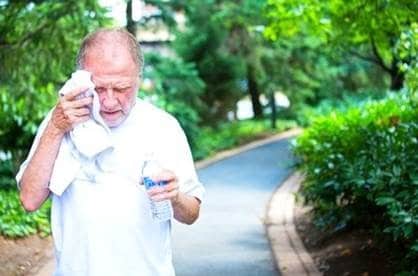Summer months in Florida often remind us of family reunions: charcoal grills smelling up the yard and the constant hum of the overhead fan at grandma's. But the steamy 98º outdoor temperature is almost unbearable. Good thing you can just step inside your grandparents' home and feel the sweet relief of 78º air conditioning. Or can you? As you arrive for this year’s family reunion, the front door opens and greets you with a blast of hot air. You ask your grandparents why it’s so hot inside their home and they respond with, “It feels fine to me!” You peek at the air conditioner's digital temperature gauge and find that the system is set to run at 86 degrees.
Should you and other family visitors worry about the high temperatures affecting an older adult? It may not be a bad idea to make sure older adults and loved ones don’t get overheated during the hot and humid summer months. Most heat-related hospitalizations occur in adults 65 and older, according to an online study published by the Centers for Disease Control and Prevention (CDC).
Older adults may be affected by high temperatures because their ability to maintain or regulate body temperature diminishes as they age. In some cases, some may also have a reduced sense of thirst, placing them at a high risk of being dehydrated.
Persistent exposure to high temperatures increases the likelihood of developing a heat-related illness, being hospitalized due to heat exhaustion or, even worse, suffering a heat stroke. Being exposed to high temperatures and suffering dehydration may worsen the health conditions of patients with cardiovascular disease, diabetes, chronic obstructive pulmonary disease (COPD), and those with Alzheimer’s or other dementias.
Medications, such as diuretics, antihistamines, and blood pressure medications, can impact the body’s ability to perspire (sweat). If a person is not able to replenish the fluids lost while sweating, he or she may become dehydrated and the risk of heat-related illnesses may increase. Dehydration can cause seniors to become dizzy and confused, increase the risk of falls and injury, contribute to urinary tract infections, and even intensify behavior problems in adults with dementia.
Heat-related conditions and illnesses
Heat edema: swelling of the hands, legs, and feet. Wedding rings may feel tight. Likewise, shoes and socks may also feel tight and binding. Sitting or standing for long periods increases the risk of developing heat edemas, especially around the feet and lower legs.
Heat rash or prickly heat: rash occurs on the skin; sweat gland pores can become blocked in certain skin areas.
Heat cramps: cramps and involuntary muscle spasms can arise after physical activity and exercise; cramping is often associated with loss of fluids, sodium, and other essential minerals.
Heat syncope: dizziness, loss of consciousness, and fainting can happen independently or in combination with other heat-related symptoms.
Heat exhaustion: dehydration and reduced blood flow contribute to the occurrence of heat exhaustion. Symptoms of heat exhaustion include profuse perspiration, headache, nausea, heart rate increase, muscle cramps, and dizziness. Being disoriented could signal the next level of severity or heat stroke.
Heat stroke: body temperature rises above 104ºF. This is the most severe form of heat-related illness and can ultimately impair the nervous system by affecting cognitive function and causing delirium, seizures, and, eventually, a coma. According to a report by the National Institutes of Health, there are revealing symptoms that may precede a heat stroke, which include: nausea, headache, confusion, and aggressive behavior.
Symptoms of dehydration
Symptoms of dehydration may vary in severity. If you are concerned about an older adult under your care, you should never wait for symptoms of dehydration to worsen before contacting a doctor. Symptoms may include the following:

- Dry mouth and extreme thirst
- Infrequent urination or urine that is dark yellow
- Irritability
- Increased confusion and dizziness
- Rapid heartbeat
- Signs of delirium or loss of consciousness
Steps to help seniors and caregivers stay hydrated on hot summer days
- Provide water during mealtimes and throughout the day. When caring for a person with Alzheimer’s, be careful not to limit fluid intake because of his or her incontinence. Limiting fluids could lead to dehydration and urinary tract infections reports the Alzheimer’s Association.
- Limit consumption of alcohol. Reduce intake of caffeinated beverages and sugary sodas.
- Prepare meals and snacks that include fruits and vegetables with high water content. Here are some tips to consider:

- Fresh strawberries have a high-water content. Strawberries are 90 percent water, in addition to being a good source of vitamin C, calcium, folate, and potassium
- Melons are also high in water content and rich in nutrients, offering a good source of vitamins A, C, and K.
- Other foods with high-water content include watermelon, cauliflower, spinach, cucumbers, celery, and tropical fruits like papaya (88 percent water) and mango (83 percent water).
- Check out an article published online by the Cleveland Clinic about foods that help quench thirst and fight dehydration.
- Identify allergies and possible drug interactions with newly added foods. Always check with a physician before making dietary changes and when an adult under your care has fluid intake restrictions.
Summer tips to help stay cool and healthy
- Stay in contact with older adults who live alone, especially during the hot summer months. If you cannot visit them daily, contact a licensed home health care provider who can do wellness checks and provide companionship.
- Provide opportunities that encourage physical activity. Sitting down for long periods in warm or hot conditions can increase the risk of heat edema. Accompany loved ones for a short, early morning walk or late afternoon stroll. If you cannot walk outside due to high temperatures or rain, you can always plan for a fun, short walk inside an air-conditioned mall near your home.
- Assist or encourage family members to have air-conditioning units periodically checked and maintained by licensed professionals. Offer to change air filters, if needed.
- Encourage loved ones to take a cool shower while you are in their home. Older adults who are a fall risk may welcome your assistance, especially if they live alone and are afraid of falling while taking a shower.
- Provide suitable summer clothing that is breathable and loose-fitting. And don’t forget to encourage loved ones and caregivers to wear summer hats and sunglasses when going outdoors. Remember to use sunscreen and bug spray while going on daily strolls.
- Limit the use of ovens and stovetops, as their use could increase the temperature inside the home.
- Be observant and watch for signs or symptoms of possible dehydration or heat-related illnesses. If you notice or suspect any problems, take immediate action and contact your loved one’s doctor or emergency medical professional for advice and assistance.
Staying in close contact and visiting vulnerable older adults, especially those who live alone, is critical in making sure they remain healthy and safe during the hot summer months. Face to face communication and social interaction provides valuable insight into a loved one’s health and provides the opportunity to assess their immediate needs.
We hope this blog provides helpful information to you and your family. Should you or your family need assistance in caring for a loved one in the near future, and would like to inquire about home health care services, call Senior Helpers Orlando at (407) 628-4357. We will be glad to schedule a meeting at your earliest convenience. Senior Helpers Orlando provides Alzheimer’s care and home health care services in the counties of Orange, Osceola and Seminole.
Ana P. DeLane
Senior Helpers Orlando Team Member
References and resources:Heat Stress Illness Hospitalizations — Environmental Public Health Tracking Program, 20 States, 2001–2010; CDC; published Dec. 2014; retrieved July 17, 2017, from https://www.cdc.gov/mmwr/preview/mmwrhtml/ss6313a1.htmNational Institutes of Health Heat Stress Program; Division of Occupational Health & Safety; NIH; published May of 2013; retrieved July 18, 2017 fromhttps://www.ors.od.nih.gov/sr/dohs/Documents/NIH%20Heat%20Stress%20Program.pdfIncontinence; Alzheimer’s Association; retrieved July 19. 2017, from https://www.alz.org/national/documents/topicsheet_incontinence.pdfUSDA Food Composition Databases, United States Department of Agriculture, Agricultural Research Service; retrieved July 15, 2017, from https://ndb.nal.usda.gov/ndb/search/listDehydrated? These 7 Foods Will Satisfy Your Thirst and Hunger; written by Brigid Titgemeier, MS, RDN; Cleveland Clinic Wellness Institute; Cleveland Clinic; retrieved July 17, 2017, from https://health.clevelandclinic.org/2014/07/dehydrated-these-7-foods-will-satisfy-your-thirst-and-hunger/